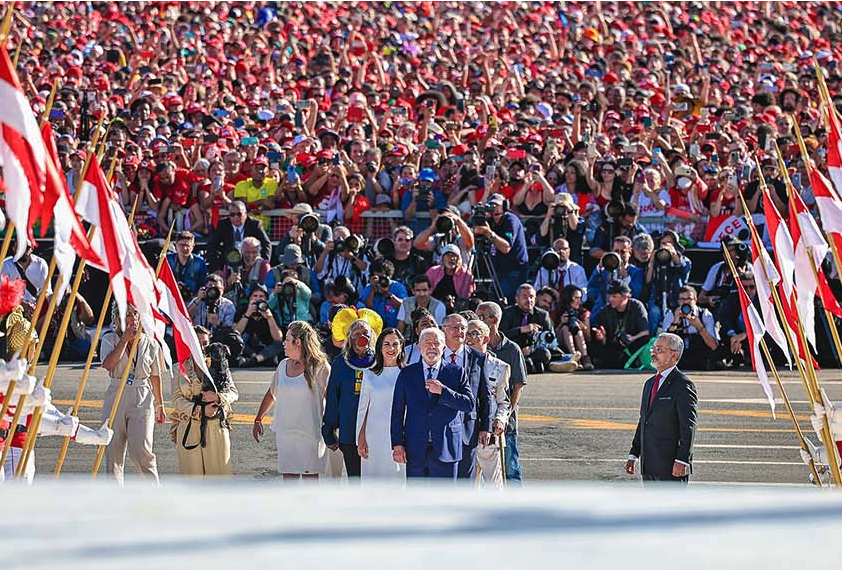https://www.realinstitutoelcano.org/en/analyses/lulas-foreign-policy-normalisation-and-friction/
Theme
After widespread relief in capitals around the world about Bolsonaro’s failed re-election bid in October 2022, Lula has normalised Brazil’s ties to the rest of the world. Yet at the same time, friction between Brazil and the West vis-à-vis the war in Ukraine, as well as Lula’s controversial views regarding Venezuela, reveal more fundamental disagreements about global order. At the same time, domestic challenges are likely to make it harder for Brazil’s President to sustain the high diplomatic pace shown so far and cede part of the foreign policy agenda to the Foreign Ministry.
Summary
Lula’s electoral victory has been greeted around the world as the return of a more engaged, predictable and constructive Brazilian foreign policy, particularly in areas such as multilateralism, the fight against climate change and regional leadership. In several areas, the new government, which was inaugurated on 1 January, has fulfilled such expectations. Brazil’s ties to major partners such as China, the US, Argentina and European powers are largely back to normal, and Brazil has, in many ways, regained its status as a key player in the Global South, reflected by Japan’s decision to invite Lula to the G7 summit in April. Numerous Western powers have made significant financial commitments to the Amazon Fund, which was recently relaunched after having been suspended under Bolsonaro. After the relationship between Brazil and the EU had deteriorated significantly, ratification of the EU-Mercosur free trade deal is now back on the table, even though a final decision is unlikely to be made in the coming months. After having largely abandoned any attempt to engage its South American neighbours under Bolsonaro, Lula organised a presidential summit in late May in an attempt to take the reins of a continent that has been largely adrift over the past decade.
Yet, at the same time, Brazilian foreign policy has been overshadowed by a widespread consternation, in the West, over Lula’s stance vis-à-vis the war in Ukraine –symbolised by comments such as considering both Ukraine and Russia equally responsible for the conflict, and that, according to Lula’s top diplomatic advisor Celso Amorim, ‘Russia’s concerns over Ukraine must be taken into account’–. While part of the most controversial statements may be attributed to Lula’s habit of making improvised and off-the-cuff remarks, his comments also reveal deep-seated misgivings about the global liberal order, which is set to complicate ties between Brazil and the West more generally in the coming years. This does not mean, however, that Brazil will systematically side with China: for example, Brasília opposes Beiing’s plan to invite additional countries to join the BRICS grouping to form an anti-Western bloc led by China. In the same way, it would be an exaggeration to say that Brazil clearly sides with Russia: after all, in February 2023, it was the only BRIC member to support a UN General Assembly resolution calling for an immediate withdrawal of Russian troops from Ukrainian territory.
Finally, despite significant potential to engage Brazil on issues such as climate change, international observers tend to underestimate the severe difficulties Lula is set to face on the domestic front, particularly if the economic scenario does not improve quickly. It must be taken into account that Brazil has just completed a decade of non-stop political upheaval during which all Presidents were either impeached or faced the spectre of impeachment, making it hard to place a sustained focus on foreign policy.
Analysis
Five months into President Lula’s third presidential term, Brazil is back on the global stage, marking a sharp break from the Bolsonaro government’s isolationist strategy that had led to a downgrade in ties to almost all major partners and diminished the country’s role in international forums. During Bolsonaro’s four years in office, Brazil’s President had picked fights with China, numerous European and Latin American countries and, once Biden came to office, with the US, which led Bolsonaro to initiate a process of de-escalation vis-à-vis Beijing. While the BRICS grouping became a political life raft for Bolsonaro and China was far less concerned about his re-election…
Read full article here









